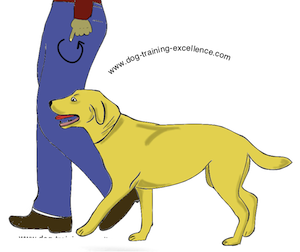
Dog training CDs are a popular method to teach your dog to behave. They can help you to de-sensitize your dog to the sounds and voices of babies. Many CDs are free to download and can be used during behavior modification sessions. This may be the best way to train your dog, whether you are a new pet owner or an existing dog owner. Dog training CDs have many benefits.
The first benefit of dog training cds is that they can teach you a great deal about the canine world. These CDs are not only useful in teaching basic skills, but they also give insight into the inner workings a dog. They also provide practical advice for reading body language and provide extensive footage of canine behavior. These CDs will help you to get your dog to behave well in public. Before you buy a CD for your dog, make sure to review it.

Interactive games for dog training cds can help you teach your dog good behavior. You have many options for interactive games to teach your dog. Many interactive games have printable versions, making it easier to train your dog. These cds are great for reinforcement and self-study. They are perfect for puppy socialization and a range of other activities.
Dog training cds will help you get your dog trained to be a therapy animal or to be your companion in daily life. Try a video or a CD for training your dog. These CDs have a lot of fun ideas. Make sure you take them everywhere you go.
There are many benefits to dog training CDs. However, there are also a few things you need to know. They are very easy to use. You can listen to them at your convenience in the privacy of your own home. You can use them to train your pet in other situations. In addition to helping your pet learn a new skill, a dog training CD is an effective way to prevent dangerous situations and save your sanity.

A CD can be purchased that helps your pet overcome phobias. As you put your puppy through different activities, they will discover what triggers the behavior. The CD will help you to deal with your dog in all situations. You can also use them to help your senior dog. A dog training CD can help you pinpoint the problems in your dog's life and make it easier to train them.
FAQ
Which size are cats and dogs easier to train?
Both. It depends on how they are trained.
Giving them rewards for doing what you want will help them learn more quickly. You can ignore them if they don’t listen. They’ll eventually start to ignore your commands.
There is no right or bad answer. The best way to teach your cat/dog is the one you choose.
Should I spay/neuter my dog?
Yes! It is important to spay and neuter your dog.
It not only reduces unwanted puppies around the world but also lowers the risk of some diseases.
In female dogs, the chance of developing breast cancer is higher than it is in male dogs.
Testicular cancer is more common in males than it is in females.
The spaying or neutering of your pet can also help to prevent her from having babies.
Is it appropriate for children to own a pet at what age?
Children under five should not have pets. Young children should not have cats or dogs.
Children who own pets often get bitten by them. This is particularly true for small dogs.
Some breeds of dog, such as pit bulls, can be aggressive towards other animals.
Although a dog may seem friendly, that doesn't necessarily mean that it won't attack an animal.
Make sure your dog is well-trained if it's your decision to buy a dog. Your child should always be supervised while playing with the dog.
Do I choose a puppy or kitten?
It all depends on who you really are. Some people like kittens while others prefer puppies.
In general, however puppies are more active, playful, and social than cats. Kittens usually sleep a lot and are very gentle.
Both types require a lot from their owners. They will quickly grow up and will require lots of care.
They will also need to be checked on a regular basis. So, you'll need to spend time taking them to the vet.
How much should I spend to get a pet?
A good rule of thumb is to budget around $200-$300 per month.
This will vary depending on where you live. In New York City for instance, the average monthly spending would be $350.
In rural areas, however, you might only need to spend $100 per month.
It's important to remember that you should buy quality items such as a collar, leash, toys, etc.
Also, consider purchasing a pet crate. This will ensure your pet is safe while being transported.
How can you tell if your dog has fleas
You may notice your pet scratching or licking excessively at its fur.
Flea infestations may also be indicated if your pet is experiencing redness.
You should take your pet to a vet as soon as possible for treatment.
What type of food should I give my dog to eat?
Your dog needs to be fed a healthy diet.
High-protein foods include chicken, beef and fish as well as eggs and dairy products.
Other foods high in carbohydrates include vegetables, fruits, breads, cereals pasta, rice, potatoes and beans.
Foods that are low in fat include lean meats, poultry, fish, nuts, seeds, and whole grains.
Before giving your dog different food types, always consult your veterinarian.
Statistics
- It is estimated that the average cost per year of owning a cat or dog is about $1,000. (sspca.org)
- * Monthly costs are for a 1-year-old female mixed-breed dog and a male domestic shorthair cat less than a year old, respectively, in excellent health residing in Texas, with a $500 annual deductible, $5,000 annual benefit limit, and 90% reimbursement rate. (usnews.com)
- Reimbursement rates vary by insurer, but common rates range from 60% to 100% of your veterinary bill. (usnews.com)
- A 5% affiliation discount may apply to individuals who belong to select military, law enforcement, and service animal training organizations that have a relationship with Nationwide. (usnews.com)
- Here's a sobering reality: when you add up vaccinations, health exams, heartworm medications, litter, collars and leashes, food, and grooming, you can expect a bill of at least $1,000 a year, according to SSPCA. (bustle.com)
External Links
How To
How do you choose the right name for your pet?
Name selection is one of most important decisions when you adopt a pet. You want your pet's name to reflect their personality.
You should also consider how others might refer to them - if you're going to use their name in conversation, for example. You should also consider how you would like to be called. What do you prefer, for example, "dog" or pet?
These are some tips to get you started.
-
Select a name to fit your dog's breed. Look up the names associated to the breed, if you have a good idea of what it is (e.g. Labradoodle). Ask someone with a good knowledge of dogs to suggest a name.
-
Take into account the meaning behind the name. Some breeds are named for people or places, others are nicknames. Because he was always running, the name Rover was given to a Labrador Retriever.
-
Think about how you'd like to be called. Is it more fun to be called "dog" than "pet"? Would you rather call your dog "Puppy", "Buddy" or "Buddy?"
-
Make sure to include the owner's name. It is a smart idea to give your dog a name that includes both your first and last names. However, it doesn't mean you should limit yourself to just including the names of family members. Your dog could grow up to become a member of your family.
-
Remember that pets can have multiple names. A cat could have several names, depending on her location. You might call her "Kitty Cat" home, but she might be "Molly" on the road with her friends. This is especially true for cats who live outside. They may choose to name themselves after the environment in which they live.
-
Be creative There are no rules stating that you have to stick to one naming convention. Just make sure that you choose something unique and memorable.
-
Check to make sure your chosen name hasn't been used by someone else or a group. That way, you won't accidentally steal someone else's identity!
-
Finally, remember that choosing a name for your pet isn't an exact science. Sometimes, it can take time to find the right name for your dog. Keep trying until you find the right name!